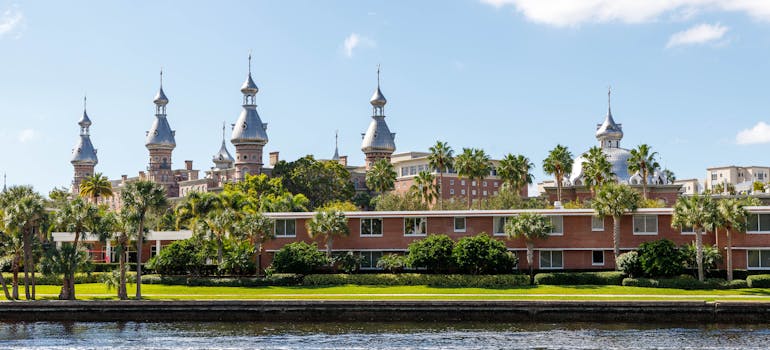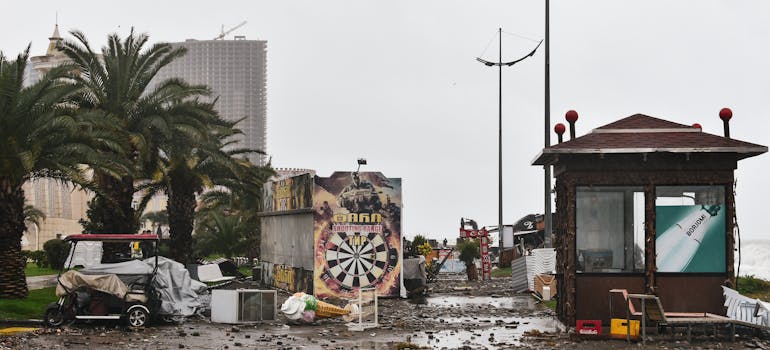Moving to Florida means sunny weather, beaches, and palm trees. However, it’s very important to remember that Florida is in the Atlantic hurricane belt, facing strong storms every year. Those considering this move should be aware of this weather. Before making the move, you should read the best Florida hurricane season moving tips. Also, if you opt for some of the best movers in Florida to help you with the moving process you can rest assured that your relocation will be handled professionally and carefully.
Stay Safe and Secure
Those considering moving to Florida must take into account Florida’s hurricane season when planning their move and their peaceful life after moving to Florida. So, by following Florida hurricane season moving tips and staying informed about evacuation routes and emergency preparedness, newcomers can take steps to protect their belongings and their homes.

Understanding Hurricane Season in Florida
Hurricane season in Florida lasts from June 1st to November 30th, with the most intense storms usually happening between August and October. Hurricanes bring heavy rain, strong winds, and big waves. They damage buildings, flood homes, and knock out power.

When it comes to hurricanes, it’s important to be prepared. Residents should secure their homes, gather supplies, and plan for evacuation. Authorities provide important information and assistance to make sure that everyone is safe. Floridians show resilience and unity, helping each other and rebuilding after storms. With preparation and teamwork, communities in Florida face the season with strength and come out stronger in the end. Some of the Florida cities affected by hurricane season where people frequently move are:
- Orlando
- Tampa
- Gainesville
- Kissimmee
- Lake City
- Ocala
Orlando
Orlando is in a low-risk hurricane zone, with 77 hurricanes recorded since 1930. The largest was Easy in 1950, and the most recent was Debby in 2012. Even though hurricanes are less common in Orlando compared to coastal areas, they can still pose risks like winds, tornadoes, power outages, and flooding. Authorities and emergency agencies in Orlando work to inform and protect residents during hurricanes. If you’re moving to Orlando, be prepared for hurricanes, learn about evacuation routes and nearby shelters. If you’re about to move there and need some help, best movers Orlando provide services customized to meet each customer’s needs and preferences.
Tampa
Tampa, Florida attracts new residents despite hurricane risks. Situated along the Gulf Coast, the city faces potential hurricanes and tropical storms. Still, people pick Tampa for living. Tampa is in a high-risk hurricane zone, with 71 hurricanes recorded since 1930. The most significant hurricane to hit the area happened in 1933, and the most recent one was Hurricane Debby in 2012. People who are planning to move here, should know that it is important for residents to stay informed about approaching storms. If you need any help worth moving, Tampa best movers are skilled professionals who can handle the logistics of your move to Tampa, from packing and loading to transportation and unloading, making the process easy and efficient even during the storm.

Gainesville
Gainesville is in a low-risk hurricane zone, with 79 hurricanes recorded since 1930. Among them, the most significant was Hurricane Dora in 1964, while the most recent was Hurricane Andrea in 2013. Despite this risk, many people choose to move to Gainesville because of its economy and renowned educational institutions like the University of Florida. When moving to Gainesville, newcomers should remain vigilant and prepared for potential hurricane impacts. For faster settling in your new home, you should get help from best movers in Gainesville. They handle tasks such as packing belongings, loading them onto trucks, transporting them to the new location, and unloading them.
Kissimmee
Kissimmee, located in central Florida, feels the effects of hurricane season like other areas in the state. Although not directly on the coast, it can still experience heavy rain and strong winds. The most recent Kissimmee, FL hurricane was Debby in 2012. Despite this, newcomers are attracted to Kissimmee for its attractions like Disney World and Universal Studios. Whether it’s a local move or a long-distance relocation during the hurricane season, best movers in Kissimmee are the right solution!
Lake City
In Lake City hurricane season can still bring effects despite being inland. It’s in a very low-risk hurricane zone, but there have been 64 recorded hurricanes since 1930. Whether residents are new or have lived there for a long time, it’s important to stay alert and prepared for potential dangers during hurricane season. They should keep up-to-date with weather forecasts and advisories from local authorities and the National Hurricane Center. If you are planning a move to Lake City, getting help from best movers in Lake City can make your moving process even more enjoyable. Hiring movers can save individuals and families time and stress associated with the moving process.

Ocala
Ocala, FL is in a very low-risk hurricane zone. The largest hurricane was George in 1998. While the city may not experience direct hits from hurricanes as frequently as coastal areas, it can still be affected by rainfall and occasional flooding during storm events. While Ocala may experience less frequent hurricane activity compared to coastal regions, residents should not underestimate the potential risks. So, moving to Ocala means living where hurricanes can happen. The best moving companies in Ocala focus on safety and readiness to handle your move even during hurricane season.
Timing Your Move During Florida Hurricane Season
When moving to areas where hurricanes are common, choosing the right time to avoid the peak hurricane season is important. Checking past weather records and forecasts can help you plan your move during safer, less risky periods. Picking the right time helps you move easier and safer. It reduces the risk of bad weather, protects your stuff, and makes it less stressful. But, if you have to move during hurricane season, watch the weather closely. Try not to move when there might be a big storm coming. It’s good to be flexible with your moving dates so you can change plans if the weather gets bad.
Preparation Before the Move to Florida
Before moving, it’s important to prepare well, especially when moving to Florida where hurricanes often happen. First, research the area to understand the geography and climate. Inform yourself about hurricane risks, flood zones, and evacuation routes. Creating a detailed hurricane plan is vital, including making evacuation routes, gathering emergency contacts, and stocking up on essential supplies like food, water, flashlights, batteries, and first aid kits. It’s also important to keep documents, such as IDs, insurance papers, and medical records, in waterproof containers to protect them from potential water damage during a storm.

So, by taking these proactive steps before moving, people can reduce risks and be prepared for any emergencies during the relocation. Getting the right insurance for belongings and property is also important. It’s important to check insurance policies to make sure they cover all possible storm damage. This includes making sure they cover wind and flood damage, as regular homeowner’s insurance might not be enough in areas with hurricanes. Also, thinking about extra insurance options or riders just for hurricanes can give more protection and peace of mind.
During the Move
When moving to Florida, safety comes first. So, be ready for challenges, especially during hurricane season. Watch the weather forecasts before and during your move. Be aware of any storms that could affect your travel plans. Change your moving schedule if needed to avoid bad weather. Make a backup plan: Think of a plan in case something unexpected happens, like bad weather. Know other routes or places to stay ahead of time and keep important phone numbers handy. Stay in touch with your moving company in case anything unexpected comes up. Load your belongings carefully onto the moving truck and make sure everything is secure.
Drive slowly, especially if the weather is bad. Keep an eye on the road and follow traffic rules. If you’re traveling a long distance, take breaks to rest and stretch your legs. Make sure to have snacks and drinks on hand to stay hydrated and energized. Once you arrive at your new home, unload your belongings carefully and place them where you want them. Take your time for unpacking and settling in. Don’t forget to take breaks and relax when you need to. Moving can be stressful, but staying calm and focused will help everything go easily.

Securing Your New Home
Make sure your new home is safe, especially in areas where hurricanes happen a lot. Check for weak spots like loose roofs or fragile windows that could make storm damage worse. Put in things like storm shutters or stronger garage doors to help your home handle strong winds and flying objects. Also, cut back trees and bushes around your house to make it safer during storms. Doing these things makes your new home stronger against hurricanes, so you can feel safer and more relaxed with your family. Learn about the local rules for hurricanes and building codes. They tell you how to secure outdoor stuff, make buildings stronger, and fix weak parts of your home to prevent storm damage. Talk to experts like contractors or home inspectors to find any problems in your home’s construction and fix them.
Settling In
Settling into your new home is exciting but can also be overwhelming. Take it step by step. Start by unpacking your essentials, like clothes and toiletries, so you can feel more at home right away. Then, gradually unpack the rest of your belongings as you have time. During this process, keep Florida’s hurricane season in mind. Check out your new neighborhood and nearby places like parks or stores to get to know where things are. It helps you get used to your new area. Say hi to your neighbors—they can provide valuable information and support, especially during hurricane season. Make your new place comfy by adding your stuff like pictures or decorations. Give yourself time to get used to your new home. Moving is a big change, so take it easy. With time, your new house will feel like home.

Follow Florida Hurricane Season Moving Tips and Make Your Move Safe and Easy!
Moving during hurricanes might seem hard, but it’s a chance to get stronger. Stay positive and plan carefully. If you follow Florida hurricane season moving tips, you can handle it well. Hurricanes can make you worried, but stay confident. Learn about your new area, pack your things safely, and know how to stay safe during hurricanes. After you get to your new home in Florida, make it yours. Look around, meet your neighbors, and make it cozy with things you like.
